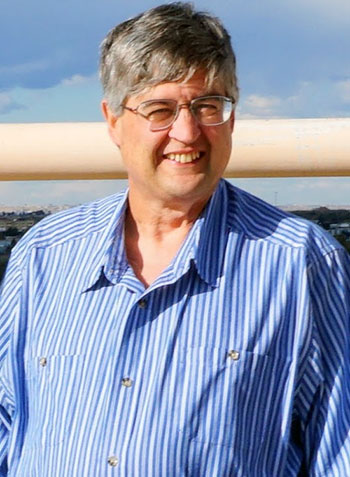Remembering Randy Ross
Faculty Matters
By Rahwa Netsanet
 (December 2017) On Dec. 20, 2016, the Department of Psychiatry suffered a great loss when Randy Ross, MD, an accomplished and treasured member of the department, passed away.
(December 2017) On Dec. 20, 2016, the Department of Psychiatry suffered a great loss when Randy Ross, MD, an accomplished and treasured member of the department, passed away.
Ross graduated from the University of California at Santa Barbara in 1983 and received his medical degree from Yale University School of Medicine in 1987. He came to the University of Colorado in 1993 as a young researcher, joining the Developmental Psychobiology Research Group (DPRG) training program.
Ross came to learn the methodologies of schizophrenia research and apply it to learning more about childhood onset schizophrenia. Though a rare diagnosis, Ross found more cases than were expected, said Robert Freedman, MD, retired chair of the Department of Psychiatry.
Concerned that the young researcher was finding diagnoses where he wanted to see them, the head of child psychiatry at the National Institute of Mental Health was invited to interview a few of the children that Ross had evaluated and to everyone’s surprise, she confirmed Ross’ diagnoses.
Working to understand the roots of mental illness, Ross was particularly interested in choline research, a lead that followed prior findings about the neurobiology of schizophrenia and related mental illnesses. He also invested time and energy in future researchers, eventually becoming vice chair of the DPRG program that began his own career on this campus.
“He was extremely generous with his time,” said Linda Greco-Sanders of the DPRG program. “He tried to toughen people up to criticism because he said it is just part of the whole experience and it’s nothing personal, one of the hardest but most important lessons for young scientists starting out to learn. If that meant telling his own stories of humiliating criticism from grant submissions, he shared it. The important thing to him was to impart knowledge.”
He gained the reputation of being harsh but fair. Camille Hoffman, MD, who worked with Ross for over eight years as a mentee and a partner in his research, called this “getting Randied.” This was a blessing in disguise. Anyone who received his feedback was bound to be challenged, but always grew from these interactions.
Ross’ life was also dedicated to his family.
“The back of his car was covered in bumper stickers indicating where his three kids had gone to college,” said Stephanie Vetter, grant manager in the Department of Psychiatry.
While keeping focused on work, there were moments of lightheartedness that gave us a glimpse into his life’s story. He grew up in Santa Barbara, Calif., and had a Farrah Fawcett haircut at one time. He liked to listen to ’70s rock in his office in the mornings and always had one shoe untied. He was a direct descendent of Jesse James. He also loved to travel – he even hitchhiked across the country when he was 18.
Though I did not get the time to know him well, I did get a bit of the ‘Randy Experience’ myself. I began working in his lab less than six months before his passing. He was very generous with his time and spoke with me about graduate programs one afternoon. I anticipated speaking
with him for 10 minutes, but I was surprised that after an hour he was still taking the time to answer my questions. I was very appreciative of his time and reflect often on that conversation.
Although we have to say goodbye to Randy, his work lives on. And I’m sure he would be happy to see that we will all be getting back to work.
Rahwa Netsanet is a Professional Research Assistant at the CU School of Medicine